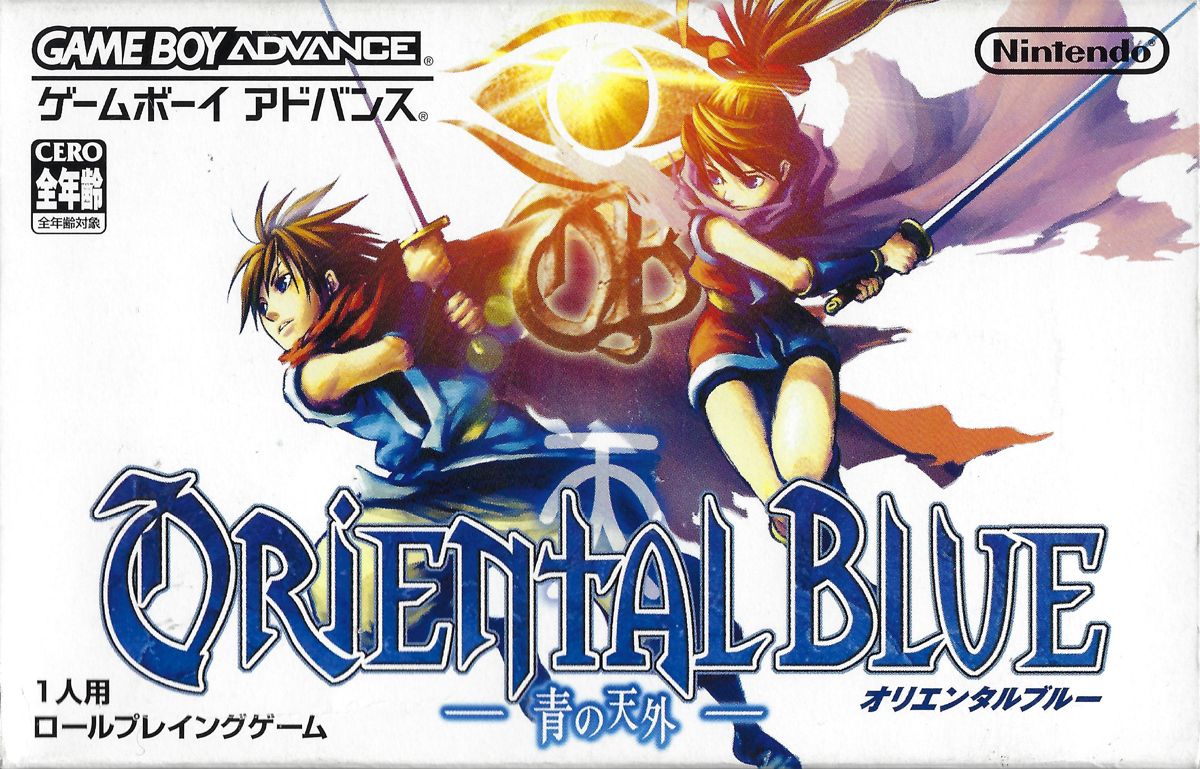Retro Replay Review
Gameplay
Oriental Blue: Ao no Tengai builds on the classic mechanics of the Tengai Makyou series while introducing a fresh sense of freedom with its non-linear structure. From the outset, you choose to embark on the adventure as either Tenran or Aoi, each offering slightly different dialogue and interaction opportunities throughout your journey. This choice adds replay value and personal investment, as you carve your own path to prove your worth to the legendary Fire Clan.
(HEY YOU!! We hope you enjoy! We try not to run ads. So basically, this is a very expensive hobby running this site. Please consider joining us for updates, forums, and more. Network w/ us to make some cash or friends while retro gaming, and you can win some free retro games for posting. Okay, carry on 👍)
The game’s overworld map is a dynamic tapestry of Jipang and its neighboring regions, rendered in a stylized first‐person perspective reminiscent of earlier entries. Travel is straightforward, but the inclusion of region‐specific encounters keeps every step exciting. As you traverse medieval Japanese towns, Mongolian plains, and Chinese valleys, random battles and scripted events blend seamlessly, ensuring you never lose momentum.
Turn‐based combat feels familiar yet refined. You’ll manage a party of up to four characters—mixing your chosen protagonist with allies you recruit along the way. Strategic depth comes from elemental affinities, weapon proficiencies, and special Fire Clan techniques. The stakes are raised by branching outcomes: lose to a boss, and instead of a game over, you follow an alternate storyline path, opening new quests and narrative twists.
Side quests further enrich the world, offering rewards ranging from rare equipment to hidden lore. The ability to tackle missions in any order lets you customize difficulty spikes and narrative pacing. Whether you prefer to master every combat encounter before facing a major boss or dive straight into story‐critical battles, Oriental Blue accommodates your style without penalizing exploration.
Graphics
Oriental Blue’s visual identity marries traditional Japanese artistry with early 2000s JRPG aesthetics. Character sprites are crisp and expressive, capturing each hero’s personality through vibrant color palettes and dynamic animations. Battle sequences shine with elemental spell effects that pop against darker backdrops, making every lightning bolt and firestorm feel impactful.
Environments are inspired by woodblock prints and classical brushwork, lending authenticity to towns, shrines, and rural landscapes. The attention to cultural detail—pagodas, lantern festivals, nomadic yurts—immerses you in a fantastical yet believable rendition of East Asia. Cinematic cutscenes employ hand‐drawn 2D art, heightening emotional moments and story reveals.
That said, some assets show their age. Textures on the overworld map can appear flat, and on occasion, character portraits lack the polish seen in modern titles. However, these minor shortcomings do little to detract from the overall charm. The game’s consistent art direction and use of authentic motifs create a cohesive visual journey that complements the narrative ambitions.
Story
At its core, Oriental Blue continues the grand tradition of the Tengai Makyou saga—an epic tale of heroism, destiny, and supernatural peril. Players step into the shoes of Tenran or Aoi, young members of the storied Fire Clan, sworn to protect Jipang from demons and warlocks. The central plot revolves around an ancient evil stirring beneath the land, threatening to plunge the realm into chaos once more.
What sets this installment apart is its branching narrative. Your choices in battle, as well as the order in which you complete missions, directly influence character relationships and story outcomes. Defeating or falling to major bosses unlocks alternate chapters, ensuring that no two playthroughs feel identical. This structure amplifies the stakes—every victory and setback carries weight beyond mere statistics.
The supporting cast spans a colorful array of allies and foes, from wandering monks to Mongolian warlords. Each new region introduces fresh cultural perspectives and moral dilemmas, fleshing out the world far beyond a single kingdom’s borders. Interpersonal dynamics, particularly between Tenran/Aoi and siblings, mentors, or rivals, add emotional resonance to your quest.
Overall Experience
Oriental Blue: Ao no Tengai offers a unique fusion of classic JRPG mechanics and innovative storytelling. Its non-linear mission structure and branching paths invite exploration and experimentation, encouraging multiple playthroughs to uncover every secret. The decision to keep you in the game world—even in defeat—reinforces a sense of persistent adventure.
While some graphical elements reflect the game’s era, the art direction remains a standout feature, immersing you in a richly realized version of medieval‐style East Asia. Combat is familiar to series veterans yet accessible to newcomers, striking a balance between strategic depth and user‐friendly design. Side quests and regional detours add further substance, giving you reasons to stray off the beaten path.
For fans of the Tengai Makyou legacy or anyone seeking a JRPG with ample freedom and cultural flair, Oriental Blue: Ao no Tengai delivers. It’s an engaging journey through a vividly crafted world, where your choices shape the fate of Jipang and beyond. Whether you’re forging alliances on the steppes of Mongolia or confronting demonic warlocks in remote Japanese shrines, this adventure promises memorable moments at every turn.
 Retro Replay Retro Replay gaming reviews, news, emulation, geek stuff and more!
Retro Replay Retro Replay gaming reviews, news, emulation, geek stuff and more!









Reviews
There are no reviews yet.